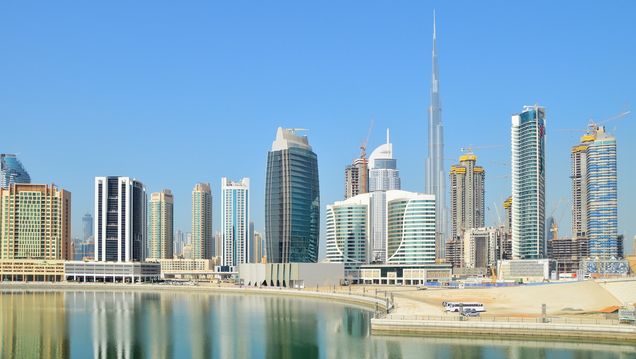Getting Paid or Pained? Highlighting the Experiences of Migrants to the Arabian Gulf Region

As part of the Human Capital Spring Speaker Series, Dr. Kathleen Park was invited to speak about her forthcoming paper on migration status, labor stratification, and labor relations in the Arabian Gulf Region on February 17, 2021. Dr. Park is an Assistant Professor of Administrative Sciences at Boston University and has conducted extensive research on labor in an emerging markets context.
Over two years of research, including data collection and ethnographic study, Park looked at the intersection of painful experiences and salary rewards of professional migrants living in the Gulf Cooperation Council (GCC) Arabian Gulf region. The research focused on six countries: Bahrain, Kuwait, Oman, Qatar, Saudi Arabia, and United Arab Emirates, which form the shared-faith economic single market known as the Gulf Cooperation Council (GCC).
At first, Park’s underlying research question focused on the emergent issues around labor internationalization, stratification, citizenship, and “caste” in the Arabian Gulf region. The scope of the project later evolved to understanding what happens when high human capital migrants – those holding high level positions and well-paid jobs in private companies – enter societies where ascribed status is more important than meritocracy, such as in the GCC Arabian Gulf region.
Between 2012-2019, more than two million individuals migrated into GCC Arabian Gulf region countries, providing strategic value and competitive advantage to business entities. “But at what cost to the migrants?” commented Park. The GCC countries are desirable destinations due to affordable yet luxurious lifestyles, income potential, career and educational opportunities, and affluent surroundings. However, migrants cannot have permanent relocation, the prospect of accessing citizenship, or intergenerational transmission of advantages – cutting short migrants’ longer-term aspirations. Interestingly, these migrant experiences remain extremely under researched and this gap is where Park’s study focuses.
In her talk, Park highlighted that one of the main differences between the labor market in the Arabian Gulf region and other upper income countries, such as the United States or Europe, is the more arduous access to flexible migration status and pathways to citizenship– even for highly skilled migrants. Additionally, a number of studies show that GDP is disproportionally allocated to citizens, meaning that there is a high, and well-documented, level of dynastic allocation of wealth in GCC countries.
Park continued with a case study of Kuwait, where there are seven levels of citizenship and two types of work visas: one mainly given to domestic helpers and the other to so-called “high capital migrants.” Further, many good jobs in the region are reserved for highly educated citizens only. Just a small number of highly qualified expatriates, if there are no available citizens for the positions, are employed in these jobs. “Here is where we can see pain and pay confluence,” commented Park.
Together with other colleagues, Park undertook an ethnographic study to understand the status dislocating as experienced by highly-skilled migrants. Over 250 interviews were conducted with people from different socio-economic backgrounds, migrant statuses, and country origins. Park shared that migrants painfully recognize that they are and feel like “outsiders,” even after residing in a country for many years.
The natural question is to ask, why do people stay if there aren’t clear opportunities for citizenship and societal advancement? Dr. Park found that the benefits of staying are most monetary, which helps overcome the difficulties of non-citizenship, and the lifestyle that comes with good income. Some migrants have developed mechanisms for coping with the difficult situation, such as deciding to leave or staying while embracing their ‘outsider’ status and creating close networks with other expatriates. Overall, while the participants do not see the GCC societies they have relocated to as meritocratic, they are overwhelmingly motivated to provide better experiences and opportunities to their children.
Despite the acceptance of second-tier status, Park’s research revealed that the psychological pain of systematic mistreatment over time can translate into actual physical pain for the people involved. Additionally, stratification of citizenship causes barriers and pain among citizens themselves, as different levels of citizenry entail different degrees of access to privileges, perceived social status, and treatment by the government.
“Organizational management and public policy could be better informed by understanding the experiences of these migrants, who in the GCC are vetted by the government and employed through the local sponsorship system,” Park noted. To conclude, Park said she hopes to expand her research on labor stratification in emerging markets, especially in almost caste-like societies of the Arabian Gulf region. “It will be essential to track future dynamics, especially with the prospect that countries will deal with economic diversification challenges.”
Sign up to receive updates from the Human Capital Initiative.